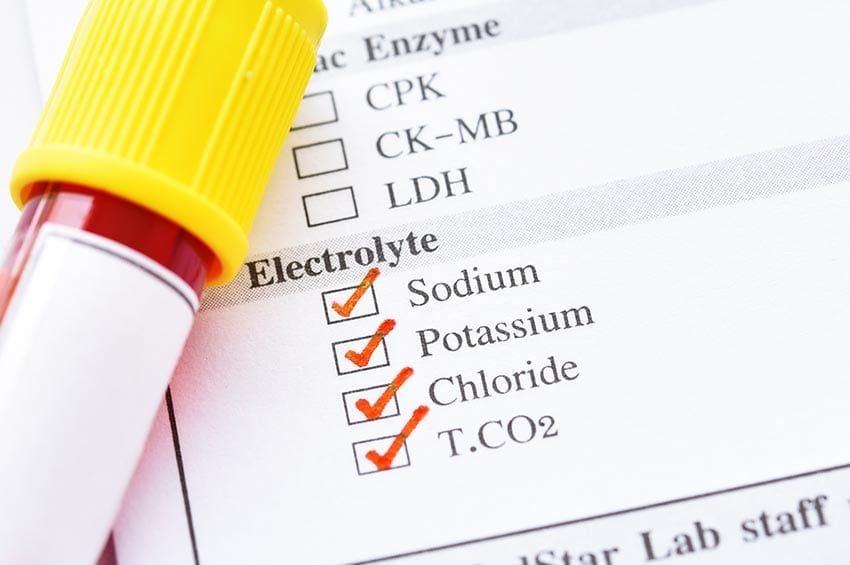
One of the most commonly discussed solutions to the keto flu is to bump your electrolyte intake up a little bit. Even as you progress past the early stages of a new keto diet, electrolytes minimize uncomfortable side effects that can accompany keto: reduced energy levels, muscle cramps, and even brain fog. Low carb diets are frequently lower in electrolytes than the standard American diet, so you will likely want to supplement with electrolytes while on keto.
But as you begin to add more magnesium, potassium, and salt to your diet, you may start to ask yourself whether it is possible to have too much electrolytes. Before you purchase expensive supplements, here is what you need to know about whether overdoing it is possible.
Balancing Your Electrolytes

First, understanding what electrolytes are is key to understanding the potential downside of over-indulging in these supplements. The term electrolytes typically refers to essential minerals that your body needs, including sodium, potassium, chloride, magnesium, and calcium, just to name a few. [1]
Electrolytes are absolutely essential to helping your body function at its very best. However, a more restrictive way of eating such as keto may lead to an electrolyte imbalance, necessitating supplements to help achieve a state of balance.
Especially in the early days, adding electrolytes into your diet can combat the effects of the keto flu and help your body adjust to keto. Unfortunately, it is possible to overdo it and consume too much electrolytes. Let’s take a closer look at how an influx of electrolytes could impact the body.
Excess Sodium and Low Potassium
One of the most basic elements in electrolytes is sodium, which many people already know is bad for their health when consumed in great quantities. Most electrolytes also include potassium.
There is a connection between high sodium levels and low potassium levels. Namely, too much sodium in the diet without potassium to balance it out can lead to high blood pressure. [2] Having high blood pressure or hypertension for an extended period of time increases your risk of both heart disease and stroke. [3]
Too Much Sodium
Electrolyte supplements are often heavy on sodium which can lead to harmful side effects. Too much sodium forces the body to hold onto more water, leading to extra work for your cardiovascular system. [4]
Too much sodium could also lead to a condition known as hypernatremia, with side effects like muscle weakness, lethargy, irritability, confusion, and extreme thirst. [5] If you notice any of these symptoms or all of them together, it may be a sign that you have had too much electrolyte supplement and need to cut back.
Other Issues with Too Much Electrolytes
Of course, there are other issues beyond the most obvious ones related to salt and potassium. Many electrolyte supplements also contain ingredients like calcium, chloride, magnesium, and phosphate which could have side effects of their own if you overdo it. [6]

Symptoms will depend on exactly which of these compounds is throwing your body into abnormal balances. You may be uncomfortable if your electrolytes are imbalanced and may experience dry mouth, numbness and tingling, heart palpitations, and even muscle weakness. Electrolyte imbalances can also lead to issues with your mental health such as feeling irritable, confused, or tired.
Most often, electrolytes should be consumed during the first few days of transitioning into a state of ketosis. During this pivotal period, your body is likely to be short on fluids and you may start to feel a bit dehydrated. This is the perfect time to increase your intake of electrolytes without so much fear of overdoing it. As bodies are different, you may need to experiment some with your electrolyte supplementation to find out what makes you feel best.
In general, taking electrolytes in the amounts recommended by the manufacturer and adding a little extra salt to your food should not cause adverse effects, but if you are taking electrolytes regularly and suffer from any of the symptoms discussed above, it may be time to either cut back on your supplementation or to see a doctor.
Blood tests can reveal imbalances in electrolytes. These tests rule out other potential causes for your symptoms and are always a good idea. It may even become clear that you need certain electrolytes (like sodium or potassium) more than others.
Electrolyte Imbalance and Ketosis
While electrolytes can be a great way to supplement your diet, it is possible to have too much of a good thing. Consider stopping electrolyte supplements after you have achieved a state of ketosis and are in the clear with keto flu unless you are feeling bad.
Short-term use of electrolytes may be called for in these circumstances, but keep track of how much you are really consuming. If you have concerns about whether your diet contains too much electrolytes, it may be time to have a conversation with your primary care doctor to look at your lab work.
References
Shrimanker I, Bhattarai S. Electrolytes. [Updated 2023 Apr 23]. In: StatPearls [Internet]. Treasure Island (FL): StatPearls Publishing; 2023 Jan-. Available from: https://www.ncbi.nlm.nih.gov/books/NBK541123/
Centers for Disease Control and Prevention. (2022, August 23). Sodium, Potassium and Health. Centers for Disease Control and Prevention. https://www.cdc.gov/salt/potassium.htm
Centers for Disease Control and Prevention. (2022b, September 8). Heart disease and stroke. Centers for Disease Control and Prevention. https://www.cdc.gov/chronicdisease/resources/publications/factsheets/heart-disease-stroke.htm
Salt and sodium. The Nutrition Source. (2023, March 7). https://www.hsph.harvard.edu/nutritionsource/salt-and-sodium/
Sonani B, Naganathan S, Al-Dhahir MA. Hypernatremia. [Updated 2023 May 20]. In: StatPearls [Internet]. Treasure Island (FL): StatPearls Publishing; 2023 Jan-. Available from: https://www.ncbi.nlm.nih.gov/books/NBK441960/
Holland, K. (2022, December 15). What you need to know about electrolyte disorders. Healthline. https://www.healthline.com/health/electrolyte-disorders#symptoms









